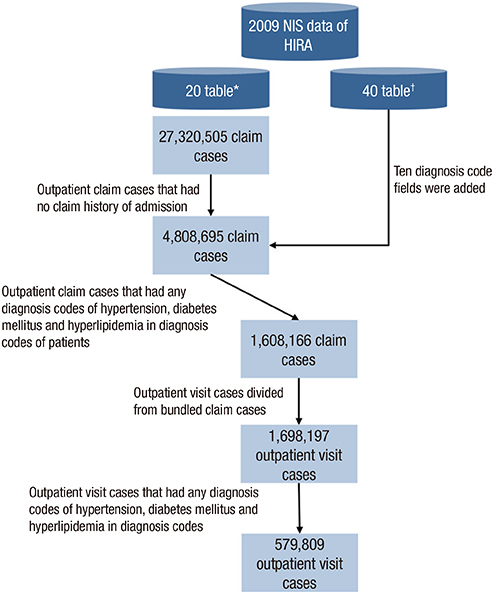Evidence of a Broken Healthcare Delivery System in Korea: Unnecessary Hospital Outpatient Utilization among Patients with a Single Chronic Disease Without Complications
- Affiliations
-
- 1Public Health Medical Service, Seoul National University Boramae Medical Center, Seoul, Korea.
- 2Department of Preventive Medicine, University of Ulsan College of Medicine, Seoul, Korea.
- 3Regional Cardiocerebrovascular Center, Chungnam National University Hospital, Daejeon, Korea.
- 4Department of Public Health, Graduate School of Konyang University, Daejeon, Korea.
- 5Department of Preventive Medicine, Chungnam National University School of Medicine, Daejeon, Korea. zepplin7@cnu.ac.kr
- KMID: 2069945
- DOI: http://doi.org/10.3346/jkms.2014.29.12.1590
Abstract
- This study aims to estimate the volume of unnecessarily utilized hospital outpatient services in Korea and quantify the total cost resulting from the inappropriate utilization. The analysis included a sample of 27,320,505 outpatient claims from the 2009 National Inpatient Sample database. Using the Charlson Comorbidity Index (CCI), patients were considered to have received 'unnecessary hospital outpatient utilization' if they had a CCI score of 0 and were concurrently admitted to hospital for treatment of a single chronic disease - hypertension (HTN), diabetes mellitus (DM), or hyperlipidemia (HL) - without complication. Overall, 85% of patients received unnecessary hospital services. Also hospitals were taking away 18.7% of HTN patients, 18.6% of DM and 31.6% of HL from clinics. Healthcare expenditures from unnecessary hospital outpatient utilization were estimated at: HTN (94,058 thousands USD, 38.6% of total expenditure); DM (17,795 thousands USD, 40.6%) and HL (62,876 thousands USD, 49.1%). If 100% of patients who received unnecessary hospital outpatient services were redirected to clinics, the estimated savings would be 104,226 thousands USD. This research proves that approximately 85% of hospital outpatient utilizations are unnecessary and that a significant amount of money is wasted on unnecessary healthcare services; thus burdening the National Health Insurance Service (NHIS) and patients.
MeSH Terms
-
Chronic Disease/*economics/*epidemiology/therapy
Comorbidity
Delivery of Health Care/economics/utilization
Health Care Costs/*statistics & numerical data
Humans
Outpatient Clinics, Hospital/*economics/*utilization
Patient Admission/economics/statistics & numerical data
Prevalence
Republic of Korea/epidemiology
Unnecessary Procedures/*economics/*utilization
Utilization Review
Figure
Cited by 5 articles
-
Comparison and Implication of the Contemporary Blood Pressure Guidelines on Korean Population
So Mi Jemma Cho, Hokyou Lee, Hyeon Chang Kim
Korean Circ J. 2020;50(6):485-498. doi: 10.4070/kcj.2019.0347.Influencing Factors of Transportation Costs Regarding Healthcare Service Utilization in Korea
Su Yeon Jang, Jeong Yeon Seon, In-Hwan Oh
J Korean Med Sci. 2020;35(35):e290. doi: 10.3346/jkms.2020.35.e290.Effect of Having a Usual Source of Care on Medical Expenses – Using the Korea Health Panel Data
Doori Kim, Sollip Kim, Hye Kyeong Park, In-Hyuk Ha, Boyoung Jung, Won-Hyung Ryu, Sang-Il Lee, Nak-Jin Sung
J Korean Med Sci. 2019;34(35):. doi: 10.3346/jkms.2019.34.e229.Impact of the 2015 Middle East Respiratory Syndrome Outbreak on Emergency Care Utilization and Mortality in South Korea
Sun Young Lee, Young-Ho Khang, Hwa-Kyung Lim
Yonsei Med J. 2019;60(8):796-803. doi: 10.3349/ymj.2019.60.8.796.A nationwide study of regional preference and graft survival of kidney transplantation in South Korea: patterns of centralization in the capital area
Jeong-Ik Park, Youngjin Jang, Hojong Park, Sungchoul Pyun, Hong Rae Cho, Sang Jun Park
Ann Surg Treat Res. 2024;106(1):11-18. doi: 10.4174/astr.2024.106.1.11.
Reference
-
1. Song YJ. The South Korean health care system. Japan Med Assoc J. 2009; 52:206–209.2. Lee JH, Choi YJ, Lee SH, Sung NJ, Kim SY, Hong JY. Association of the length of doctor-patient relationship with primary care quality in seven family practices in Korea. J Korean Med Sci. 2013; 28:508–515.3. Kwon S. Payment system reform for health care providers in Korea. Health Policy Plan. 2003; 18:84–92.4. Chun CB, Kim SY, Lee JY, Lee SY. Republic of Korea: health system review. Health Syst Transit. 2009; 11:1–184.5. Kwon S. Thirty years of national health insurance in South Korea: lessons for achieving universal health care coverage. Health Policy Plan. 2009; 24:63–71.6. Organisation for Economic Co-operation and Development. OECD healthcare quality review: Korea, assessment and recommendation. accessed on 1 February 2014. Available at http://www.oecd.org/korea/49818570.pdf.7. Kim HJ, Kim YH, Kim HS, Woo JS, Oh SJ. The impact of outpatient coinsurance rate increase on outpatient healthcare service utilization in tertiary and general hospital. Health Policy Manag. 2013; 23:19–34.8. Cho SJ, Chung SH, Oh JY. Differences between diabetic patients’ tertiary hospital and non-tertiary hospital utilization according to comorbidity Score. Korean J Health Policy Adm. 2011; 21:527–540.9. Kim L, Sakong J, Kim Y, Kim S, Kim SY, Tchoe B. Developing the inpatient sample for the National Health Insurance claims data. Health Policy Manag. 2013; 23:152–161.10. Sundararajan V, Quan H, Halfon P, Fushimi K, Luthi JC, Burnand B, Ghali WA. International Methodology Consortium for Coded Health Information (IMECCHI). IMECCHI). Cross-national comparative performance of three versions of the ICD-10 Charlson index. Med Care. 2007; 45:1210–1215.11. Woo HK, Park JH, Kang HS, Kim SY, Lee SI, Nam HH. Charlson Comorbidity Index as a Predictor of Long-Term Survival after Surgery for Breast Cancer: A Nationwide Retrospective Cohort Study in South Korea. J Breast Cancer. 2010; 13:409–417.12. Lee JH, Ko BS, Leem JH, Lee SI. Standard model and quality appraisal framework for the organization of primary care. J Korean Med Assoc. 2013; 56:866–880.
- Full Text Links
- Actions
-
Cited
- CITED
-
- Close
- Share
- Similar articles
-
- The Effects of Case Management for Medicaid on Healthcare Utilization by the Medicaid System
- Change in Healthcare Utilization by Disease Severity after Case Management for Medicaid
- Evidence-Based Healthcare: Seeking for the Broken Virtuous Circle
- Impact of level of physical activity on healthcare utilization among Korean adults
- Factors influencing medical institution selection for outpatient services


